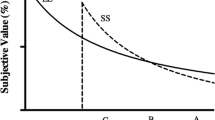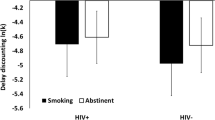Abstract
Introduction
Quit attempts made by smokers that result in relapse to smoking are conceptualized in behavioral economics as preference reversals, in which preference for a larger–later outcome switches to preference for a smaller–sooner outcome. Though preference reversals are predicted by models of delay discounting, we are aware of no human research that has explicitly established that rate of delay discounting is associated with preference reversals. The present study attempted to establish this connection.
Method
Assessments of delay discounting of hypothetical money rewards at two magnitudes ($50, $1000) were examined for forty-five smokers, as well as a novel preference reversal task designed to determine when a preference reversal would occur for the same amounts of hypothetical money. Results from the preference reversal task were used to classify participants as predicted high, moderate, and low discounters, and rates of delay discounting were compared between these classifications at each magnitude.
Results
Statistically significant differences were observed between predicted high and low discounters in both magnitude conditions, and between predicted high and moderate discounters in the $1000 magnitude condition. Correlations between delay discounting and preference reversal amongst moderate discounters, though in the predicted direction, did not reach statistical significance.
Discussion
The overall pattern of results are consistent with the indication that rate of delay discounting is associated with the timing of preference reversals.




Similar content being viewed by others
References
Ainslie, G., & Herrnstein, R. (1981). Preference reversal and delayed reinforcement. Animal Learning and Behavior, 9, 476–482.
Bickel, W. K., Odum, A. L., & Madden, G. J. (1999). Impulsivity and cigarette smoking: Delay discounting in current, never-, and ex-smokers. Psychopharmacology, 14, 447–454.
Center for Disease Control and Prevention (2014). Fact sheet: Fast facts. Office on Smoking and Health. Retrieved from http://www.cdc.gov/tobacco/data_statistics/fact_sheets/fast_facts/.
Cohen, S., & Lichtenstein, E. (1990). Perceived stress, quitting smoking, and smoking relapse. Health Psychology, 9(4), 466.
Dallery, J., & Raiff, B. R. (2007). Delay discounting predicts cigarette smoking in a laboratory model of abstinence reinforcement. Psychopharmacology, 190(4), 485–496.
De Wilde, B., Bechara, A., Sabbe, B., Hulstijn, W., & Dom, G. (2013). Risky decision-making but not delay discounting dmproves during inpatient treatment of polysubstance dependent alcoholics. Frontiers in Psychiatry, 4, 1–7.
Du, W., Green, L., & Myerson, J. (2002). Cross-cultural comparisons of discounting delayed and probabilistic rewards. Psychological Record, 52, 479–492.
Fagerstrom, K. O., & Schneider, N. G. (1989). Measuring nicotine dependence: A review of the Fagerstrom tolerance questionnaire. Journal of Behavioral Medicine, 12(2), 159–182.
Green, L., & Estle, S. J. (2003). Preference reversals with food and water reinforcers in rats. Journal of the Experimental Analysis of Behavior, 79, 233–242.
Green, L., Fisher, E. B., Jr., Perlow, S., & Sherman, L. (1981). Preference reversal and self-control: Choice as a function of reward amount and delay. Behaviour Analysis Letters, 1, 43–51.
Green, L., Fristoe, N., & Myerson, J. (1994). Temporal discounting and preference reversals in choice between delayed outcomes. Psychonomic Bulletin & Review, 1, 383–389.
Heinz, A. J., Peters, E. N., Boden, M. T., & Bonn-Miller, M. O. (2013). A comprehensive examination of delay discounting in a clinical sample of Cannabis-dependent military veterans making a self-guided quit attempt. Experimental and Clinical Psychopharmacology, 21(1), 55–65.
Holt, D. D., Green, L., & Myerson, J. (2003). Is discounting impulsive? Evidence from temporal and probability discounting in gambling and non-gambling college students. Behavioural Processes, 64, 355–367.
Holt, D. D., Green, L., Myerson, J., & Estle, S.J. (2008). Preference reversals with losses. Psychonomic Bulletin and Review, 15(1), 89–95.
Johnson, M. W., & Bickel, W. K. (2008). An algorithm for identifying nonsystematic delay-discounting data. Experimental and Clinical Psychopharmacology, 16(3), 264.
Killen, J. D., Fortmann, S. P., Newman, B., & Varady, A. (1991). Prospective study of factors influencing the development of craving associated with smoking cessation. Psychopharmacology, 105(2), 191–196.
Kirby, K. N. (1997). Bidding on the future: Evidence against normative discounting of delayed rewards. Journal of Experimental Psychology: General, 126, 54–70.
Kirby, K. N., & Herrnstein, R. J. (1995). Preference reversals due to myopic discounting of delayed reward. Psychological Science, 6(2), 83–89.
Luhmann, C. C. (2013). Discounting of delayed rewards is not hyperbolic. Journal of Experimental Psychology: Learning, Memory, and Cognition, 39(4), 1274.
MacKillop, J., Amlung, M. T., Few, L. R., Ray, L. A., Sweet, L. H., & Munafò, M. R. (2011). Delayed reward discounting and addictive behavior: A meta-analysis. Psychopharmacology, 216(3), 305–321.
MacKillop, J., & Kahler, C. W. (2009). Delayed reward discounting predicts treatment response for heavy drinkers receiving smoking cessation treatment. Drug and Alcohol Dependence, 104(3), 197–203.
Madden, G. J., & Johnson, P. S. (2010). A delay-discounting primer. In G. J. Madden, W. K. Bickel, & T. S. Critchfield (Eds.), Impulsivity: The behavioral and neurological science of discounting (pp. 11–37). Washington, DC: American Psychological Association.
Matusiewicz, A. K., Carter, A. E., Landes, R. D., & Yi, R. (2013). Statistical equivalence and test–retest reliability of delay and probability discounting using real and hypothetical rewards. Behavioural Processes, 100, 116–122.
Mazur, J. E. (1987). An adjusting procedure for studying delayed reinforcement. In M. L. Commons, J. E. Mazur, J. A. Nevin, & H. Rachlin (Eds.), Quantitative analyses of behavior: Vol. 5. The effect of delay and of intervening events on reinforcement value (pp. 55–73). Hillsdale, NJ: Erlbaum.
Millar, A., & Navarick, D. J. (1984). Self-control and choice in humans: Effects of video game playing as a positive reinforcer. Learning and Motivation, 15, 203–218.
Mitchell, S. H. (1999). Measures of impulsivity in cigarette smokers and nonsmokers. Psychopharmacology, 146, 455–464.
Mueller, E. T., Landes, R. D., Kowal, B. J., et al. (2009). Delay of smoking gratification as a laboratory model of relapse: effects of incentives for not smoking, and relationship to measures of executive function. Behavioral Pharmacology, 20, 461–473.
Noor, J. (2011). Intertemporal choice and the magnitude effect. Games and Economic Behavior, 72(1), 255–270.
Passetti, F., Clark, L., Davis, P., et al. (2011). Risky decision-making predicts short-term outcome of community but not residential treatment for opiate addiction. Implications for case management. Drug and Alcohol Dependence, 118, 12–18.
Passetti, F., Clark, L., Mehta, M. A., Joyce, E., & King, M. (2008). Neuropsychological predictors of clinical outcome in opiate addiction. Drug and Alcohol Dependence, 94, 82–91.
Peters, E. N., Petry, N. M., LaPaglia, D. M., Reynolds, B., & Carroll, K. M. (2013). Delay discounting in daults receiving treatment for marijuana dependence. Experimental and Clinical Psychopharmacology, 21(1), 46–54.
Ratcliff, R. (1993). Methods for dealing with reaction time outliers. Psychological Bulletin, 114, 510–532.
Reynolds, B. (2006). A review of delay-discounting research with humans: Relations to drug use and gambling. Behavioural Pharmacology, 17, 651–667.
Secades-Villa, R., Weidberg, S., García-Rodríguez, O., Fernández-Hermida, J. R., & Yoon, J. H. (2014). Decreased delay discounting in former cigarette smokers at one year after treatment. Addictive Behaviors, 39(6), 1087–1093.
Sheffer, C., MacKillop, J., McGeary, J., Landes, R. D., Carter, L., Yi, R., & Bickel, W. K. (2012). Delay discounting, locus of control, and cognitive impulsiveness independently predict tobacco dependence treatment outcomes in a highly dependent, lower socioeconomic group of smokers. The American Journal on Addictions, 21(3), 221–232.
Sheffer, C. E., Christensen, D. R., Landes, R. D., et al. (2014). Delay discounting rates: a strong prognostic indicator of smoking relapse. Addictive Behaviors, 39(11), 1682–1689.
Shiffman, S., Paty, J. A., Gnys, M., Kassel, J. A., & Hickcox, M. (1996). First lapses to smoking: Within-subjects analysis of real-time reports. Journal of Consulting and Clinical Psychology, 64(2), 366.
Stanger, C., Ryan, S. R., Fu, H., Landes, R. D., Jones, B. A., Bickel, W. K., & Budney, A. J. (2012). Delay discounting predicts adolescent substance abuse treatment outcome. Experimental and Clinical Psychopharmacology, 20(3), 205–212.
Stevens, L., Verdejo-Garcia, A., Goudriaan, A. E., et al. (2014). Impulsivity as a vulnerability factor for poor addiction treatment outcomes: a review of neurocognitive findings among individuals with substance use disorders. Journal of Substance Abuse Treatment, 47(1), 58–72.
U.S. Department of Health and Human Services (1989). Reducing the health consequences of smoking: 25 years of progress--a report of the Surgeon General (DHHS publication no. 89–8411). Rockville, MD.
Washio, Y., Higgins, S. T., Heil, S. H., McKerchar, T. L., Badger, G. J., Skelly, J. M., & Dantona, R. L. (2011). Delay discounting is associated with treatment response among cocaine-dependent outpatients. Experimental and Clinical Psychopharmacology, 19(3), 243–248.
West, R. J., Hajek, P., & Belcher, M. (1989). Severity of withdrawal symptoms as a predictor of outcome of an attempt to quit smoking. Psychological Medicine, 19(4), 981–985.
Yi, R., & Landes, R. D. (2012). Temporal and probability discounting by cigarette smokers following acute smoking abstinence. Nicotine and Tobacco Research, 14(5), 547–558.
Yi, R., Landes, R. D., & Bickel, W. K. (2009). Novel models of intertemporal valuation: past and future outcomes. Journal of Neuroscience, Psychology, and Economics, 2(2), 102–111.
Yi, R., Mitchell, S. H., & Bickel, W. K. (2009). Delay discounting and substance abuse-dependence. In G. J. Madden, W. K. Bickel, & T. S. Critchfield (Eds.), Impulsivity: The Behavioral and Neurological Science of Discounting (pp. 191–211). Washington, DC: American Psychological Association.
Yoon, J. H., Higgins, S. T., Heil, S. H., Sugarbaker, R. J., Thomas, C. S., & Badger, G. J. (2007). Delay discounting predicts postpartum relapse to cigarette smoking among pregnant women. Experimental and Clinical Psychopharmacology, 15(2), 176–186.
Author Note
This research was funded by NIDA grant R01 DA11692. The authors have no conflicts of interest. The authors would like to acknowledge Kayla N. Tormohlen for her assistance with manuscript preparation.
Author information
Authors and Affiliations
Corresponding author
Ethics declarations
Funding
This study was funded by NIDA grant R01 DA11692.
Conflict of Interest
All authors declare that they have no conflicts of interest.
Ethical Approval
All procedures were in accordance with the ethical standards of the University of Maryland IRB and with the 1964 Helsinki declaration and its later amendments or comparable ethical standards.
Informed Consent
Informed consent was obtained from all individual participants included in the study.
Rights and permissions
About this article
Cite this article
Yi, R., Matusiewicz, A.K. & Tyson, A. Delay Discounting and Preference Reversals by Cigarette Smokers. Psychol Rec 66, 235–242 (2016). https://doi.org/10.1007/s40732-016-0165-4
Published:
Issue Date:
DOI: https://doi.org/10.1007/s40732-016-0165-4




